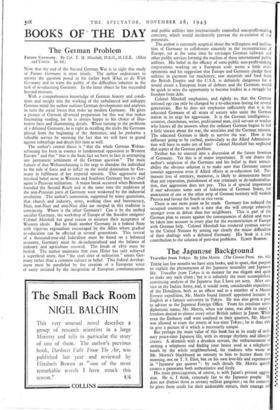BOOKS OF THE DAY
The German Problem
Now that the end of the Second German War is in sight this study of Future Germany is most timely. The author endeavours to answer the question posed in his earlier book What to do With Germany and to warn the public of the difficulties inherent in the task of re-educating Germany. In the latter object he has succeeded beyond measure.
With a comprehensive knowledge of German history and condi- tions and insight into the working of the unbalanced and unhappy German mind the author outlines German developments and analyses in turn the social forces that make up modern Germany. He gives a picture of German all-round preparation for this war that makes fascinating reading, for he is always happy in his choice of illus-
trative facts and illuminating details. When turning to the problems of a defeated Germany, he is right in recalling the ,tricks the Germans played from the beginning of the Armistice, and he performs a valuable service by stressing the fact that we will have to guard
against subterfuge and deceit this time as well.
The author's central thesis is " that the whole German Weltan- schauung has been in essence in fundamental opposition to Western Europe " and that " that is the basic fact we have to face in attempting any permanent settlement of the German question." The main feature of that Weltanschauung is the urge to abandon the individual to the rule of force and to inflict on the world domination by Ger- many in fulfilment of her imperial mission. This aggressive and mystical belief arose in Western and Southern Germany but its chief agent is Prussian militarism. A major break occurred when Bismarck founded the Second Reich and at the same time the traditions of the non-Prussian parts of Germany were weakened by the industrial revolution. The author's contention, supported by many quotations, that church and industry, army, working class and bureaucracy, Nazi, non-Nazi and anti-Nazi alike are steeped in this tradition is convincing. Where is the other Germany? Can it be the unified socialist Germany, the workshop of Europe of the Socialist emigres?
Colonel -Minshall has good reason to mistrust their acceptance of Western ideals. But he finds anothef Germany in a federal State with vigorous regionalism encouraged by the Allies where gradual re-education can be effected in several generations. This revival of a thousand-year-old federalism must be based on a balanced economy, Germany must be de-industrialised and the balance of industry and agriculture restored. The break of 187o must be healed. The author maintains that even Hitler has only achieved a superficial unity, that " the steel shirt of militarism " unites Ger- many rather than a common culture or belief. This federal develop- ment must be paralleled by the creation of a European sense of unity initiated by the integration of European communications
and public utilities into internationally controlled non-profit-making concerns, which would incidentally prevent the re-creation of war potentials.
The author is extremely sceptical about the willingness and inclina- tion of Germany to collaborate sincerely in the" reconstruction of Europe, yet at the same time he envisages German railways and other public services forming the nucleus of these international public utilities. His belief in the efficacy of semi-public non-profit-making corporations working on a European scale seems a little over- optimistic and his suggestion that Europe and Germany pledge their utilities in payment for machinery, raw materials and food from the British Empire and the U.S.A. is definitely dangerous for it would create a European front of debtors and the Germans would be quick to seize the opportunity to become leaders in a struggle for freedom from debt.
Colonel Minshall emphasises, and rightly so, that the German national ego can only be changed by a re-education lasting for several generations. But he does not emphasise sufficiently that it is the educated Germans of all strata of society who unite the German nation in its urge for aggression. It is the German intelligentsia : scientist, churchman, writer, professional man, civil servant or teacher who knows all the answers when the ordinary German begins to feel a little uneasy about the war, the atrocities and the German mission. The educated German is likely to survive the war. How is his influence going to be curbed, particularly as the Allied Administra- tion will have to make use of him? Colonel Minshall has neglected that aspect of the German problem. Neither has he entered into a discussion of the future frontiers of Germany. Yet this is of major importance. If - one shares the author's suspicion of the Germans and his belief in their intract- ability the obvious solution is to make sure that Germany cannot commit aggression even if Allied efforts at re-education fail. Per- manent loss of territory, moreover, is likely to demonstrate better than any reparation, punishment of war criminals or de-industrialisa- tion, that aggression does not pay. This is of special importance if one advocates some sort of federation of German States, for annexation of one or the other strip of German territory will weaken Prussia and favour the South or vice versa.
There is one more point to be made. Germany has reduced the occupied countries to such a state that she will emerge relatively stronger even in defeat than her neighbours. This is part of the German plan to ensure against the consequences of defeat and must be taken into account in every plan for the reconstruction of Europe with German help. Colonel Minshall has rendered yeoman service to the United Nations by setting out clearly the major difficulties of their dealings with a defeated Germany. His book is a real contribution to the solution of post-war problems. ELROY BABOON.


























 Previous page
Previous page